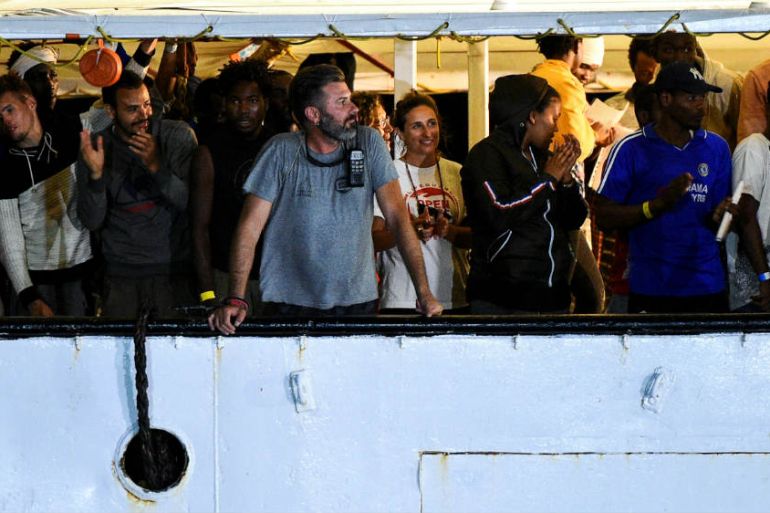Open Arms rescue ship faces $1m fine from Spain
The Open Arms saga has not ended with the Italian prosecutor’s order to bring the scores of rescued people ashore.

The humanitarian charity operating the Open Arms ship, saving the lives of refugees and migrants at risk in the Mediterranean Sea, may face a $1m fine from Spanish authorities.
The prospect of a possible penalty comes after a protracted standoff between the Spanish NGO Proactiva Open Arms and Italy’s far-right Interior Minister Matteo Salvini finally came to an end.
Keep reading
list of 4 items‘Mama we’re dying’: Only able to hear her kids in Gaza in their final days
Europe pledges to boost aid to Sudan on unwelcome war anniversary
Birth, death, escape: Three women’s struggle through Sudan’s war
The Open Arms had for days been stuck off the Italian island of Lampedusa as Salvini refused to let it dock.
But as tensions on board soared and Spain dispatched a military ship to assist in the arrival of the stranded people to a Spanish port, an Italian prosecutor eventually ordered they be brought ashore.
“The Open Arms doesn’t have a permit to rescue,” Spain’s Deputy Prime Minister Carmen Calvo told Spanish radio.
“This is a state ruled by law, everyone knows what they can do, what they can’t.”
The Open Arms had in April been authorised to leave Barcelona, where it was immobilised for three months, to transport humanitarian aid to Greece.
It was reportedly banned from heading to the seas off Libya, where people attempt the perilous journey to Europe on rickety boats, but went anyway.
A document by the directorate-general for Spain’s merchant navy sent to AFP news agency by the Proactiva Open Arms charity said it risks a fine of up to 901,000 euros ($1m) for violating this ban.
Returning with more than 140 migrants on board, the ship wanted to dock in Lampedusa, the nearest safe port. Malta is a similar distance to the location the refugees and migrants were rescued from.
But Salvini, who has banned all NGO rescue boats from entering Italian ports, prevented the ship from docking on Italian land.
As the days went by, tensions rose on the ship; some people had been on board for 19 days after being picked up at sea, many were thought to be suffering from post-traumatic stress.
The ship was initially carrying 147 people, mainly from African countries. Some were evacuated for medical care and all unaccompanied children were allowed ashore on August 17.
The deteriorating health conditions on board prompted the prosecutor’s eventual order on Tuesday to bring the 83 who remained on board to shore.
Six European Union countries – France, Germany, Romania, Portugal, Spain and Luxembourg – have offered to take them in.